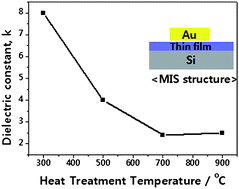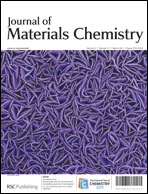Thermal transformation of solvent-processable organosilicon compounds into inorganic silicone-based thin films
Abstract
In this study, a solution-processable precursor, decaphenycyclopentasilane (DPCPS) was synthesized and successfully converted into an inorganic thin film through the heat treatment process. When the DPCPS coating was heat-treated at various temperatures up to 900 °C, the organic DPCPS was converted into an inorganic compound composed of Si, C and O atoms in the form of SiCxOy. The relative compositions of Si, C, and O changed with the heat-treatment temperatures changing the carbon content, for example, from 88.9% for the pristine DPCPS to 3.0% for the specimen heat-treated over 700 °C, consequently becoming SiC0.05O1.7. The dielectric constant of the heat-treated DPCPS could be tailored with the heat treatment temperatures from high- to low-dielectric materials, i.e., 10.8 at 300 °C and 2.3 at 900 °C, providing tunable dielectric properties for various optoelectronic applications. The resulting inorganic thin films had excellent coating characteristics with low RMS roughness (<1.0 nm).


 Please wait while we load your content...
Please wait while we load your content...